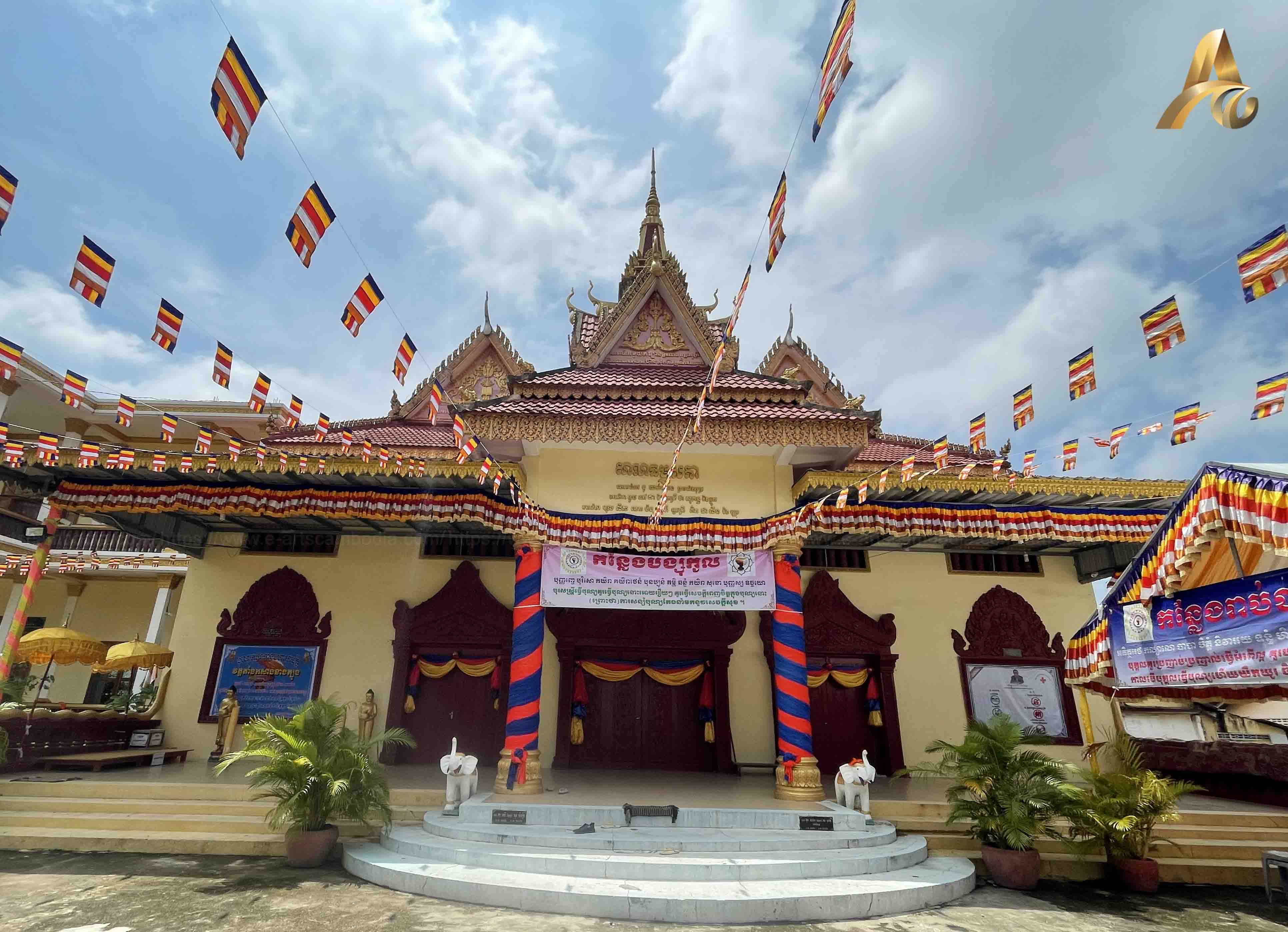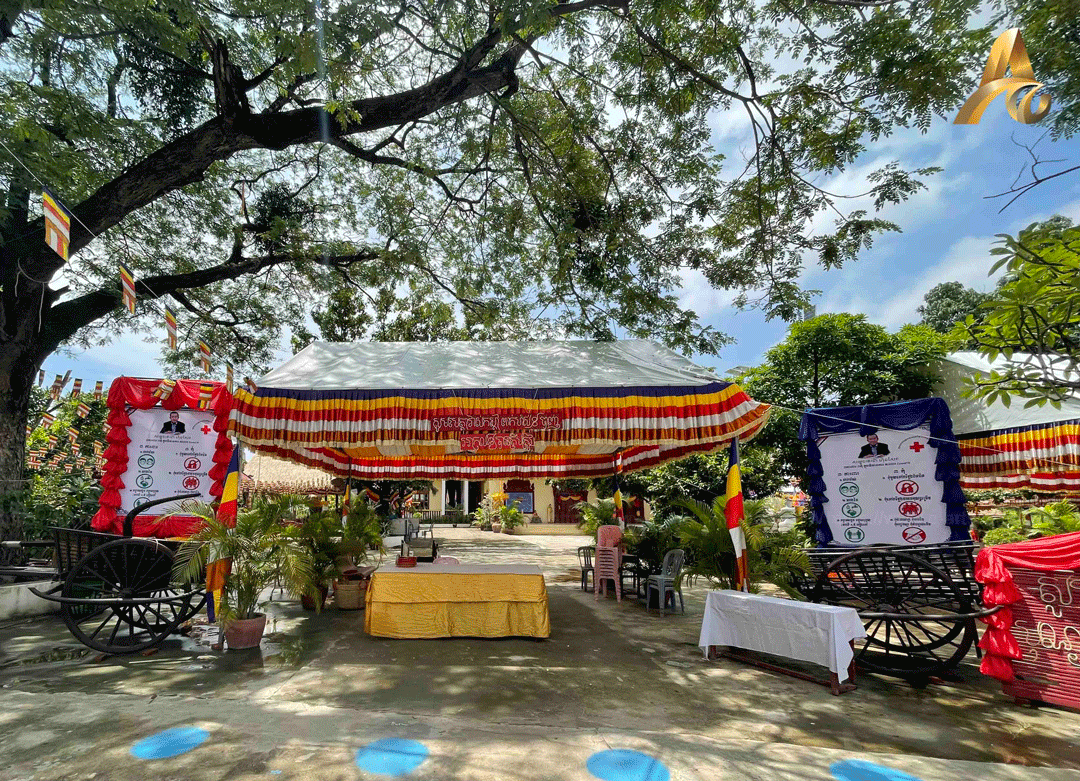Phnom Penh: People bring flowers to pagodas. Candles and incense being lit for prayer. Foods being offered to the monks. Traditional music using yike and lakhon basac reverberating in these sacred places. At night, monks recite a prayer. These are just some of the activities during the Pchum Ben festival. One of the most important festivals in the Khmer calendar – for Buddhist people. This is the time when Cambodians pay respects to their deceased relatives of up to seven generations.
In the Khmer language, Pchum or Brochum means “a meeting or gathering”. While Ben means “a ball of something”, such as rice or meat. It is also known as “Ancestors Day.” The first 14 days is called Kan Ben. Villagers visit at least seven different pagodas to fulfill their good deeds during this time. Cambodians usually travel to the provinces to meet with their relatives. This is the time to offer food to what they call the “hungry ghosts”. It refers to the spirits of their deceased loved ones.
However, this year’s Pchum Ben is being observed in a safer way, After Prime Minister Hun Sen together with the Ministry of Health and the Ministry of Cults and Religions decided to suspend the biggest religious holiday in Cambodia, but people can still celebrate at their homes to prevent another outbreak of Covid-19 in the Kingdom.
The date varies every year. Usually, it starts within September, the rainy season in Cambodia.
Khmer Buddhists believe that this is the darkest month. A month that the ghosts come to visit their families. And both old and young Cambodians say they hugely value and believe in Pchum Ben.
EAC has visitied the Puthyvong Saram Pagoda in Kampong Speu province. It has been raining here every day since the past week. Villagers spend time to pray in their local pagodas. Monks are busy preparing for their biggest festival. Apart from offering food and flowers, this is also the moment that Khmer people pause from farming for a while to unite with their friends and families. The rainy season means a rest for farmers. Since farming is the main source of income for the majority of Cambodians.
But after working throughout the year, the older generation of Khmers explain how important Pchum Ben is to them.
A grandfather, Kin Lim says, “It is important. First, we need to maintain the Buddhist tradition that our ancestors have been celebrating every year since the beginning of Buddhism. Second, it is our devotion to our dead relatives because they cannot touch, hold and see things like we all do. We dedicate the merits to the monks.” Another Kampong Speu resident, Sin Inn says, “I feel happy and fulfilled in dedicating my offerings to all my dead relatives – parents, grandparents and all my relatives up to seven generation.” While another grandfather Nherl Nal told EAC News how important the devotion during this time is, “I wish all my relatives who already passed away including our patriotic ancestors and heroes who lost their lives during the war, may they go to heaven and bless us with glory and prosperity.”
Cambodians bring offerings of foods to the pagodas for the monks. They then help them to perform their good deeds according to Buddhist practices. These sons and daughters dedicate their good deeds to their deceased relatives. Since it is being observed by the whole family, the younger generation also plays an important role and already have a plan on how to spend their time during Pchum Ben.
A boy, Kim Oun says, “I will help my family to prepare food during Pchum Ben to offer it to all our dead relatives.” While Srey Rath, says she will help her family in preparing foods and bring it to pagoda to pay gratitude to their dead loved ones. Another young Cambodian, Win has spoken to EAC News saying, “This is very important to all Cambodian people because this is a Khmer festival, a Khmer tradition that people must respect to dedicate to their families who have passed away. I believe this is a tradition that has been practiced since the beginning of Cambodia.”
EAC News visits Nikrot One Kol Toteurng pagoda in Phnom Penh to get a clearer story behind Pchum Ben. A well-known monk and a professor of Personal Growth and Virtue, Behaviour, Leadership, Buddhism and Psychology Development, Venerable Kou Sopheap explains how Pchum Ben started. He says, “The story behind the Pchum Ben festival goes back to the time when there was a story about the ghost came to the palace of the King of India. And those ghosts were the relatives of the king. They already passed away years and years ago. The king was very frightened in the middle of the night. He was so scared when he got up in the morning and went to the Buddha and asked him about those sound of yelling in the palace. And then Buddha said, “Nothing wrong with you, but your long long time relatives came to visit you and want you to help them.” The king said, “What can I help them?”. Buddha suggested to him to invite monks and offer food and dedicate his marriage to his relatives. He did and so his relatives were very happy – rejoiced the marriage of the king and be born in the higher area of that marriage.”
According to Venerable Sopheap, Pchum Ben is very important to both the older and younger generations. He has added, “Usually, the younger people go to the temple in the morning at about 4:00 o’ clock. They have one ceremony called “Bos Bay Ben”. They go there, go around in the main building of the temple and put rice somewhere here, somewhere there and dedicate those rice to the hungry ghosts. They believe the hungry ghosts can receive that kind of food from them and eat and be happy during that time. So, they usually go to the temple in the morning. Some temples they organise their activity in the late afternoon. So, the younger people come to the temple in the late afternoon or early evening lighting the candle, pay homage to the Buddha, Dhamma, Sangha – the triple gem.”
He says that is being called “gratitude”. The younger generation pay gratitude to the living person. The parents who are alive. But when they pass away, Cambodians still want to pay gratitude to them.
But since they cannot go and offer directly to the spirit of their ancestor, they offer food to the monks and dedicate that offering to their relatives. Now, let’s see what parts or areas in the pagoda are the most important during Pchum Ben. Venerable Sopheap shows them to us.
Sopheap has showed some of the sacred places saying, “The Buddha relic is inside. So, people come to pay homage. Usually, in the early evening, people come to light candles here. It’s the centre for gathering. Usually people come here, pay tribute to the Buddha, we put the small Buddha relic inside. We call in Khmer “jedey”, but during the pandemic we cannot do that. They will come individually. And they offer flowers, candle, to the Buddha inside or outside here. This is the Buddha tree where the Buddha got enlightenment. We brought the Buddha tree from India “Bodh Gaya”. And then we have a candle lighting ceremony here at six o’ clock in the early evening.
He says, usually, the young people wanted to come at the late afternoon or early evening. They come at six o’ clock and then they pray, they chant, they meditate and then offer flower to the Buddha and then go back. The Buddha tree also plays and important role. He says the story goes, “Buddha sit there and meditate and enlightenment and then he was happy under the Buddha tree for seven days, sit without eating. And then he said, ‘I feel relieved a lot. I want to stand to make sure my body is healthy. He stands there for another seven days. And then he stands to meditate, looking at the Buddha tree saying, ‘Thank you very much for offering me place for meditating. And then he felt, Okay, I stand so long, I would now like to walk.’ So, he walked and meditate for another seven days. Sopheap has added that pagodas have 15-days of candle lighting – every late afternoon or early evening.


PHOTO: SARY





















